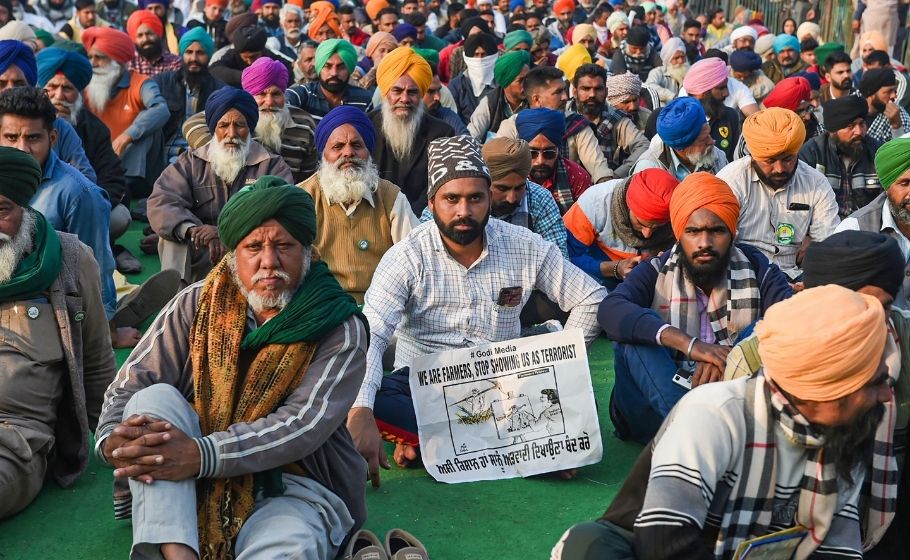
Farmers prepare for 7th round of talks, say failure means ‘intense protests’

Representatives of farmers’ unions who are slated to meet the government at Delhi’s Vigyan Bhawan on Monday (December 4) have said that they stand by their initial demands to repeal the three farm laws, assurance on the minimum support price (MSP) and implementation of the Swaminathan committee report, failing which they will intensify their protest.
Tractor marches on key highways, sit-in outside Raj Bhavans, strikes and protests across the country and burning of the new laws on the occasion of harvest festival Lohri are among the few means of protests that the unions have planned if the seventh round of talks with the government prove inconclusive.
“In the meeting, our delegates will talk about the repeal of three farm laws, making a law for the minimum support price (MSP) and implementing the Swaminathan Committee report,” Rakesh Tikait, national spokesperson of Bhartiya Kisan Union (BKU) said.
“The protest enters its 40th day today and the government has tried its best to break it by calling it a protest of one state. The truth is that the protest has now widely spread all over India. Despite the government’s many allegations, the number of farmers protesting against the laws is increasing by the day,” he added.
Related news: Farmers marching to Delhi face tear gas at Rewari-Alwar border
Gurnam Singh Chadauni of the BKU, Haryana told The Federal that they will not settle for anything less than the said demands.
In the sixth round of talks between the farmers and the government on December 30, 2020, the government had removed the Electricity (Amendment) Bill 2020 and the penal provision for farm fires. Union agriculture minister Narendra Singh Tomar claimed that 50 per cent issues have been resolved after the meeting.
Commenting on minister’s remark, Chadauni said, “Our main demands are repealing the farm laws and assuring MSP. The main ones are not addressed yet. It is like 90 per cent of the work is still pending. The government has moved just an inch and not even 50 per cent.”
Intense protests in the offing
The farmers have decided to intensify their agitation if their demands are not met on Monday. In a press conference on Friday (January 1), the farmer leaders said that only five per cent of their demands have so far been discussed and they will announce dates for shutting all malls and petrol pumps in Haryana.
“We have decided to hold a tractor march on the highways if the demands are not met in today’s meeting. We have also decided that from January 6 to 20, we will hold demonstrations, hunger strikes, rallies and street shows across the country,” said Dr Darshan Pal, president of Krantikari Kisan Union, Punjab.
He said the farmers will celebrate Lohri on January 13 by burning the farm bills.
“January 18 will be celebrated as farmers’ day and on that day the women farmers will come forward and hold strikes. On the birth anniversary of Netaji Subhash Chandra Bose on January 23, we will conduct protests in front of the governor’s house in every state. On January 26, more farmers will come to Delhi from all over the country with their tractors and we will hold a parallel tractor parade in the national capital and all over the country as well,” Pal said.
However, the leaders maintained that the protests will be peaceful.
“We have made a team of 4,000 volunteers who will ensure that peace is maintained during the protest. We are getting support from everywhere only because the protest is peaceful and it will remain peaceful,” said Jagjit Singh Dallewal of BKU Sidhupur.
What about 60 lost lives? ask farmers
As many as 60 farmers have died at the protest site so far, the latest being the suicide of a farmer at the Ghazipur border. In his suicide note, the farmer held the government responsible for his death and demanded that his last rites be performed at Ghazipur border.
Of the 60 deceased farmers, a majority died due to cold-induced heart attack, while others died either by accident or suicide.
Dr Mridul Sarkar, a doctor working on the Singhu border explained that cold weather conditions make one’s heart work harder to keep the body warm.
Related news: Farmers fight tricky sludge of poor credit, odd monsoon, crop loss
“The cold makes the flow of blood difficult, leading to the formation of blood clots in the body. A heart attack usually occurs when a blood clot blocks blood flow to the heart. This is what is happening to the farmers on the border. They are exposed to high cold and thus die due to Myocardial infarction, commonly known as heart attack,” he said.
Rakesh Tikait held the government responsible for all the 60 deaths of farmers on the borders.
“The government tried many times to break our peaceful protest but never uttered a single word on these deaths. This is shameful and shows that the government don’t care about the farmers.”


